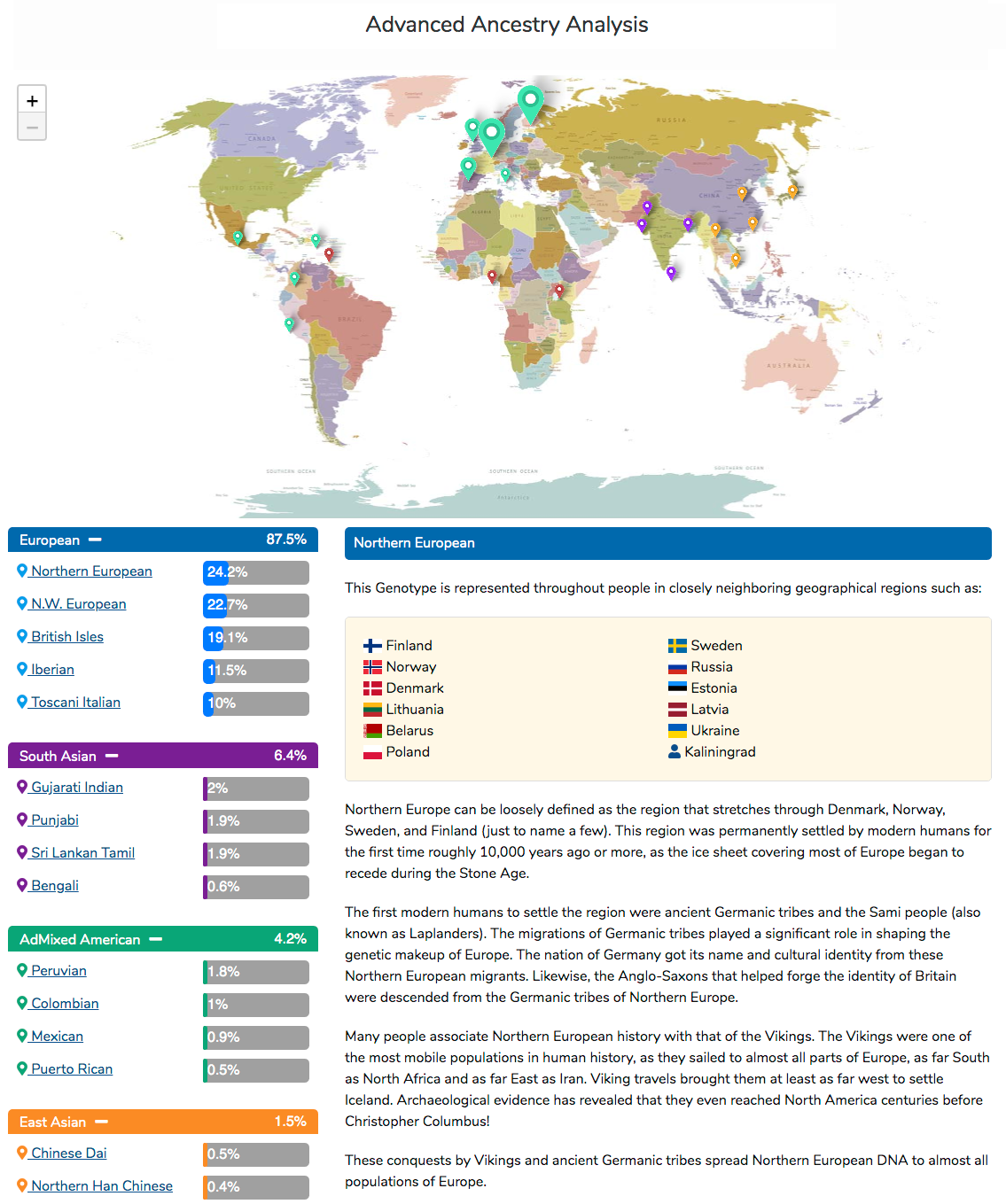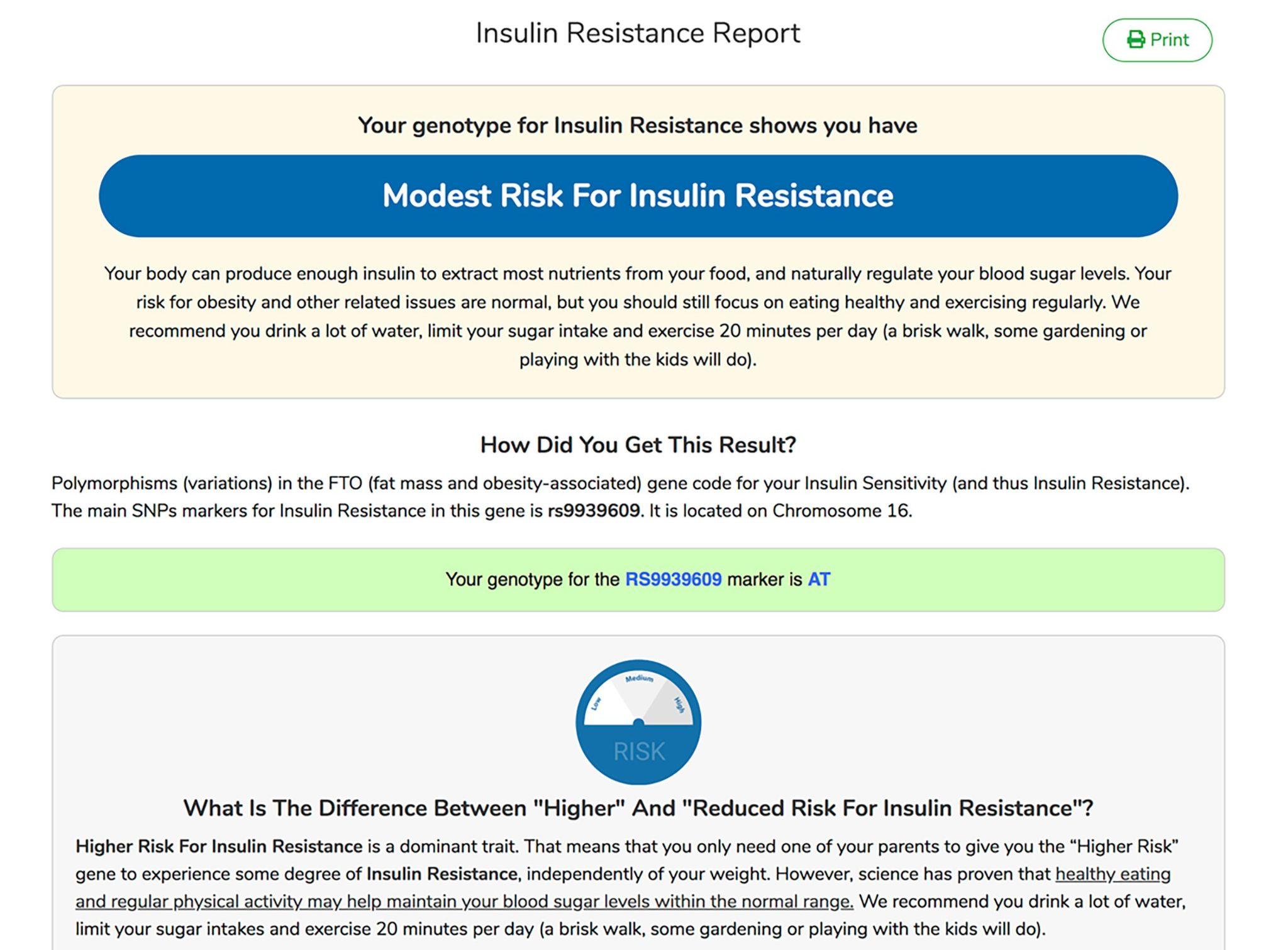
What are the differences and similarities between CRI Genetics vs Ancestry DNA? Read on to learn more about each company, what they have to offer for health and ancestry, and what other alternatives you should consider.
CRI Genetics vs Ancestry DNA Overview
- CRI Genetics and Ancestry DNA do not accept raw DNA data from other companies.
- CRI Genetics offers a limited scope of health reports.
- Ancestry does not offer health reports, only traits.
- Neither CRI Genetics nor Ancestry DNA provide polygenic risk scores (PRS) for advanced genetic risk analysis.
- Neither company offers multiomics integration to combine genetics with lab results and lifestyle data.
- Neither company has peer-reviewed publications validating their predictions.
- Ancestry is available worldwide.
- CRI Genetics only ships DNA kits to five countries.
About CRI Genetics and Ancestry DNA
CRI Genetics was founded in 2017 by Ph.D. Alexei Fedorov, a molecular geneticist with 35 years of experience in the field. The company is based in Santa Monica, California. You can learn more about this company in this CRI Genetics review.
Ancestry.com was founded in the 90s by John Sittner, Paul Brant Allen, and Dan Taggart. Their initial product was an online library of records for family tree building, and it was only in 2002 that they began offering DNA testing. Read this Ancestry review to learn more about the company.
CRI Genetics vs Ancestry DNA: How do they compare?
Here, we’ll discuss what CRI Genetics and Ancestry DNA have in common, and what is different about their services.
DNA test & Raw DNA data
CRI Genetics analyzes a little over 520,000 SNPs to generate their reports. This company only ships to the United States, United Kingdom, Puerto Rico, Mexico, and Canada. Seeing as they do not allow you to upload your raw DNA data to their platform, access to their services is limited to those countries.
On the other hand, Ancestry DNA tests around 640,000 SNPs, and their test kits are available worldwide. However, similar to CRI Genetics, Ancestry also does not allow you to upload a DNA file.
Both CRI Genetics and Ancestry DNA results can take up to 8 weeks to be ready.
Ancestry reports
CRI Genetics claims to provide you with an ancestry timeline going back up to 50 generations. Ancestry DNA tells you your geographic origins across 1,500 regions and identifies potential relatives through DNA matching.
Health reports
CRI Genetics’ health reports are divided into five categories:
- Allergies
- Nutrition
- Vitamin
- Traits
- Weight loss
Each category includes six to eleven reports that will tell you how likely you are to have a certain health trait or condition. Each trait comes with a brief explanation and general advice. For example, to address insulin resistance, CRI Genetics only recommends that you drink water, limit your sugar intake, and exercise 20 minutes per day.
It’s also worth noting that the reports do not include the scientific research that was used to establish the correlation between the marker and the health condition. The number of traits and insights is very limited, and the recommendations do not take into account all the individual attributes. You can see a snippet of a sample report below.
Keep in mind that if you want to get multiple reports from CRI Genetics, you’re required to take separate DNA tests for each report.
As of January 2021, Ancestry announced the discontinuation of their health report, AncestryHealth. The company does offer you the option to add information about common genetic traits to your ancestry test for an extra fee.
Prices
CRI Genetics prices are:
- Ancestry ($99)
- Ancestry + Health ($199)
- Allergy + Health ($199)
- Weight Loss ($99)
- Weight Loss + Health ($199)
AncestryDNA tests offer the following prices:
- AncestryDNA ($99): Origins + Ethnicity, DNA Matches
- AncestryDNA + World Explorer Membership ($100): Origins + Ethnicity, DNA matches, 3-month membership (renews at $99.95 every three months)
- AncestryDNA Traits + All Access Membership ($199): Origins + Ethnicity, DNA matches, traits, 3-month membership (renews at $99.95 every three months)
Privacy
CRI Genetics claims not to share any personally identifiable information with third parties. However, they do implement anonymous genetic data in their research project. By agreeing to the terms, customers consent to having their data added to the company’s database and be used for results that may be published in journals.
Ancestry claims not to share personal information with third parties without consent, except as described in their privacy statement. They may share genetic information with research partners, which can include commercial or non-profit organizations that conduct or support scientific research, the development of therapeutics, medical devices, or related materials to treat, diagnose, or predict health conditions.
Ancestry had a partnership with Google’s health subsidiary Calico, which has since ended. By getting access to Ancestry’s genetic database, Calico aimed to study the genetics of longevity.
Alternatives to CRI Genetics and Ancestry DNA
If you want real health insights, SelfDecode is the standout alternative. Unlike CRI Genetics and Ancestry, SelfDecode analyzes over 200 million genetic variants, integrating your DNA, lab results, and lifestyle. SelfDecode delivers thousands of personalized health reports, offering actionable recommendations for diet, supplements, and lifestyle based on ancestry-adjusted polygenic risk scores (PRS).
SelfDecode offers a full health optimization platform, not just a DNA test. You get access to 1,500+ health topics, multi-omics integration, lab tracking for over 4,000 biomarkers, personalized meal and supplement plans, and ancestry insights with mitochondrial lineage. Everything is backed by published research, HIPAA and GDPR compliance, and advanced AI analysis of 200M variants. CRI Genetics and Ancestry can’t match this depth, personalization, or scientific rigor.
SNP Analysis vs PRS vs Advanced PRS
Many DNA tests focus on individual SNPs, but these give only a small snapshot of risk. While this approach was common in the early 2000s, it is now considered outdated and offers limited predictive value. Some companies continue to use single-SNP analysis because it is inexpensive and requires minimal technological investment, but this comes at the expense of accuracy and actionable insights.
In contrast, developing a polygenic risk score (PRS) involves aggregating thousands of SNPs, significantly improving predictive accuracy. Advanced PRS models, particularly those enhanced with AI and ancestry adjustments as implemented by SelfDecode, provide far more reliable predictions. SelfDecode’s Advanced PRS integrates millions of variants per report, along with lab results and lifestyle data, to deliver precise, personalized recommendations for diet, supplements, and health strategies.
This comprehensive approach sets SelfDecode apart from competitors such as CRI Genetics and Ancestry, offering both depth and actionable insights. Read more here.
CRI Genetics vs Ancestry DNA comparison
| SelfDecode | CRI Genetics | Ancestry | |
|---|---|---|---|
| Health Insights | Comprehensive — 1,500+ conditions with actionable diet, lifestyle, and supplement recommendations | Limited | None |
| Genes & gene variants analyzed | Up to 200 million genetic variants | ~520,000 SNPs | ~600,000 SNPs |
| Polygenic Risk Scores (PRS) | Advanced PRS with ancestry-adjusted scoring, validated in a Nature journal | Not Available | Not Available |
| Actionable Recommendations | Personalized and holistic, integrating labs, symptoms, and genetics | General Guidance | Not Available |
| Raw data download | Yes | Yes | Yes |
| Scientific Validation | 6+ published studies, AI-enhanced predictive modeling | Limited | Limited |
Conclusion
Understanding what CRI Genetics and Ancestry DNA offer is the first step in making an informed decision. Both companies provide ancestry services, with Ancestry DNA boasting the largest database of profiles and historical records.
However, when it comes to health, both services are limited. CRI Genetics provides a small set of health reports, while Ancestry has discontinued health reports entirely and now focuses solely on ancestry and traits. Neither company offers advanced polygenic risk scores (PRS), multiomics integration, or peer-reviewed validation of their predictions, tools that are increasingly essential for accurate and actionable health insights.
For anyone serious about optimizing their health, a more comprehensive, wellness-focused platform like SelfDecode offers a clear advantage. SelfDecode analyzes millions of genetic variants, integrates lab and lifestyle data through multiomics, and delivers ancestry-adjusted PRS with peer-reviewed validation. Users gain personalized recommendations for hundreds of health conditions, along with detailed ancestry insights, including mitochondrial lineage, all backed by published scientific research.
Related
- What Is The Best DNA Test Kit? The Ultimate Guide
- Best DNA Test for Health + 6 Things you Need to Know
- CRI Genetics vs 23andMe: DNA Tests, Results & Are They Worth It?



